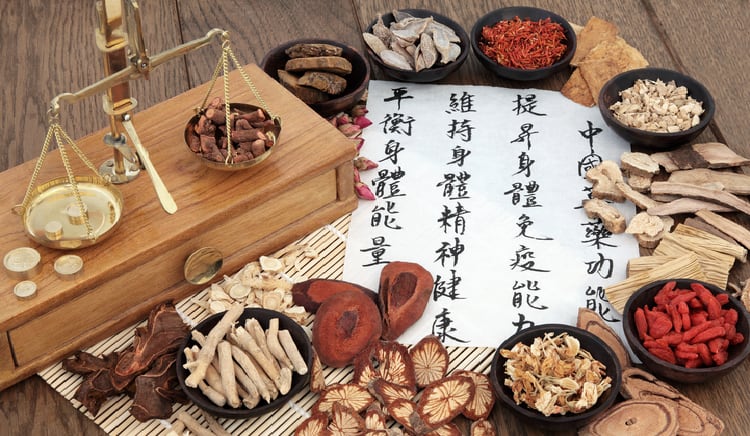Academics from the China Academy of Chinese Medical Sciences and Beijing University of Chinese Medicine reviewed 11 published RCTs that looked at the use of TCM for treatment of age-related diseases in humans.
They also reviewed past animal models that examined the health benefits of TCM such as ginkgo biloba and ginseng.
The review findings were recently published in scientific journal Oxidative Medicine and Cellular Longevity.
Herbs’ benefits
- Ginkgo biloba
Known as Yinxing in Chinese, studies have shown that Ginkgo biloba extract (EGb) is beneficial for age-related diseases such as type 2 diabetes, dementia, and coronary heart disease.
It also displays pharmacological effects of improving insulin resistance, protecting the vascular endothelium, and preventing atherosclerosis.
In fact, the first international expert consensus regarding the clinical application of EGb for treating dementia and moderate cognitive impairment was published last year.
A mice study conducted by Tian et al. found that that EGb at doses of 200 and 400mg/kg/day for 12 weeks could regulate glucose and lipid metabolism and reduce arterial plaque.
2. Panax ginseng
Ginsenosides – the main active ingredients of panax ginseng, also known as hongshen in Chinese – have displayed pharmacological effects such as relieving fatigue, improving immunity, regulating blood glucose, and protecting liver and kidney functions.
A mice study by Lee et al showed that ginseng consumption for 24 weeks continuously could improve age-related cognitive ability.
3. Rhodiola rosea
Also known as hongjingtian in Chinese, rhodiola rosea is commonly consumed as a preventive supplement for altitude sickness.
Rich in alkaloids, flavonoids, glycosides, and phenolic compounds, it could protect the heart and brain vessels via anti-fibrosis.
A study by Zhou et al showed that feeding rhodiola rosea to atherosclerosis rat for nine consecutive weeks could lead to anti-atherosclerosis by lowering blood lipids and regulating endothelial function.
4. Ligusticum chuanxiong
The herb contains tetramethylpyrazine (TMP), ligustrazine, vanillin and other compounds which affects the cardiac and cerebrovascular system, nervous system, as well as the respiratory system.
A mice study by Chen et al showed that TMP intake interfered with Parkinson’s disease induced in the mice.
The study thus showed that TMP products against dopaminergic neurodegeneration.
The researchers concluded that ‘through in vivo and in vitro studies, various components of herbal medicine have been found to possess the ability to intervene in agieng-related diseases by activating telomerase, increasing antioxidant capacity, reducing apoptosis and anti-inflammatory activities, and regulating ageing-related pathways and exosomes.’
Adverse effects from herbs
The use of some of these TCM is, however, not without safety concerns.
Some have led to adverse side-effects such as palpitations, allergic reactions.
In one of the RCTs, a 49-year-old man complained of two palpitations within a month after consuming 40mg of Ginkgo biloba thrice daily for two weeks to improve his cognitive abilities.
A 12-lead ECG showed that the man’s sinus rhythm displayed frequent ventricular premature beats. Once the consumption of Ginkgo biloba stopped, the electrocardiographic evidence of ventricular arrhythmias was resolved.
Another RCT on Sailuotong – a formula containing gingko biloba, ginsenosides, and saffron for vascular dementia – observed side-effects such as gastrointestinal intolerance.
Moving forward, the researchers said that high-quality RCTs should be carried out to observe the effectiveness and safety of herbal medicine in the treatment of age-related diseases.
‘The safety of drug use is one of the important contents of clinical pharmacology; herbal medicine has drawbacks in this respect.
‘Further studies are needed to completely understand these widely used herbs or compounds and their efficacy in ageing-related diseases,’ the researchers said.
This study is supported by the Special Project for Outstanding Young Talents of China Academy of Chinese Medical Sciences and National Major Scientific and Technological Special Project for the ‘National New Drug Innovation Program’ during the 13th Five-year plan period.
Source: Oxidative Medicine and Cellular Longevity
New Insights for Cellular and Molecular Mechanisms of Aging and Aging-Related Diseases: Herbal Medicine as Potential Therapeutic Approach
https://doi.org/10.1155/2019/4598167
Authors: Yanfei Liu, et al



